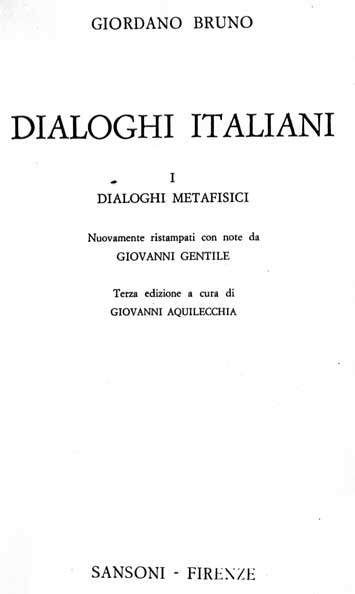De l'infinito universo e mondi. All'illustrissimo signor di Mauvissiero, stampato in Venezia, anno MDLXXXIIII, in Giordano Bruno, Dialoghi italiani, I, Dialoghi metafisici, nuovamente ristampati con note da Giovanni Gentile, terza edizione a cura di Giovanni Aquilecchia, Sansoni, Firenze, 1958, pp. 343-544.
De l’infinito, universo e mondi (London 1584) is the third of Bruno’s Italian cosmological works, also dedicated to Michel de Castelnau, the French ambassador at London. Though being a dialogue, this work presents an argumentational style similar to a philosophical treatise. Bruno develops and thoroughly investigates the principles of a new infinitist cosmology, directing his criticism especially against the Aristotelian Physics and De caelo. The Brunian philosophy of nature, which draws inspiration from the Presocratics, develops an infinitist cosmology on the grounds of a monistic ontology. Such an ontology provides for the unity of the principle which animates the universe within the multiplicity of individual things, subject to the ‘vicissitude’ as natural law. In Bruno’s perspective, the infinite universe without center, the homogeneous space and the plurality of worlds are conceived of in their physical reality.
Click here to go directly to the text
|
|
In De l'infinito, universo et mondi Bruno developed his cosmological theory by systematically criticizing Aristotelian physics. Bruno argues for the physical reality of the infinite universe with no centre. He also formulated his Averroistic view of the relation between philosophy and religion, according to which religion is considered as a means to instruct and govern ignorant people, and philosophy as the discipline of the elect who are able to behave themselves and to govern others.
